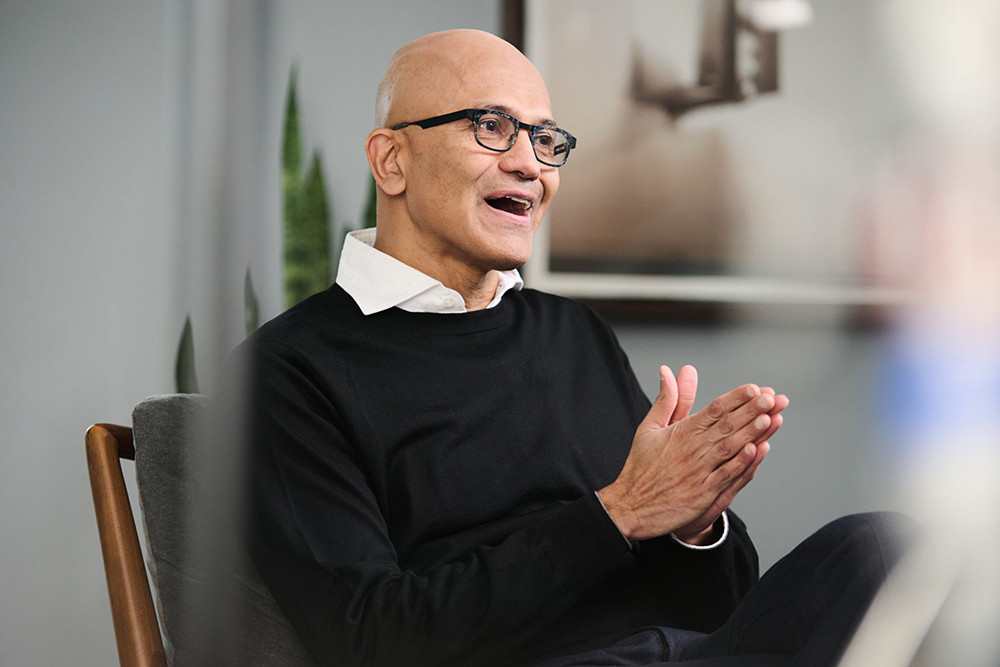
至少對于科技股而言,去年可以說是艱難的一年。惡性通脹和美聯儲(Federal Reserve)激進加息對高增長行業產生了影響,使以科技股為主的納斯達克綜合指數下跌超過30%。然而,盡管這些不利因素的影響延續到了2023年,但今年一場人工智能繁榮幫助科技股實現驚人逆轉。Wedbush的丹·艾夫斯認為,科技股反彈仍處在初級階段。
這位科技行業的分析師在周日發表的一份研究報告中提到了人工智能的整體潛在市場。他表示:“我們估計,在未來十年,人工智能市場將帶來8,000億美元的商機,企業和消費科技領域將上演‘權力的游戲’。”
去年11月,由微軟(Microsoft)投資的OpenAI發布生成式人工智能聊天機器人ChatGPT,它可以回答問題,編寫電郵,甚至能通過MBA考試。之后,投資者紛紛看好人工智能,許多科技公司擔心落后,被迫發布或至少展示了最新技術。
谷歌在2月發布聊天機器人Bard,Meta隨后在同一個月發布了LLaMA。生成式人工智能技術還被應用于新圖片生成軟件,例如OpenAI的DALL-2、Stable Diffusion和Midjourney等,這些軟件可根據提示文本生成逼真的圖片。但人工智能不止局限于聊天機器人和圖片生成軟件。艾夫斯表示,人工智能技術將顛覆互聯網領域,會涌現出各種各樣的應用,這意味著即使在經濟低迷的大背景下,投資者依舊不應該坐失良機。
艾夫斯寫道:“超級智能的人工智能可能顛覆人類世界的幾乎每一個部分。”他認為,該技術“的智慧程度實際上已經超過了人類。”
摩根大通(JPMorgan)正在利用人工智能幫助預測美聯儲的行動,而人工智能軟件公司Palantir本月早些時候表示,其戰場情報平臺有“空前的需求”,這都可以證明他的觀點。
不止艾夫斯看好人工智能。在上周召開的《財富》最具影響力商界女性大會上,方舟投資管理公司(Ark Invest)的凱西·伍德表示,未來幾年,人工智能將在許多行業產生廣泛但積極的“顛覆性影響”,她表示特斯拉(Tesla)將是人工智能技術最大的受益者。高盛(Goldman Sachs)高級策略師本·斯奈德上周表示,他預測未來十年,隨著生產率大幅提高,人工智能將使企業利潤增長30%。
艾夫斯認為,目前“人工智能軍備競賽”的領先者是微軟。這位分析師從上世紀90年代開始分析科技股,他認為薩蒂亞·納德拉的微軟將CharGPT整合到旗下的搜索引擎必應(Bing),能夠搶占谷歌搜索市場的份額。
他寫道:“對于微軟而言,必應變現的機會是巨大的。改版后的必應從谷歌手中搶走的每一個百分比的份額,都將帶來數十億美元的廣告收入。”
艾夫斯表示,微軟還擁有云服務器業務Azure,因此它可以從早期人工智能研發階段中獲利。正如微軟云計算與人工智能團隊執行副總裁斯科特·格思里曾在3月份的一篇文章中所說的那樣,微軟用幾年的時間建設云計算業務的“超級計算資源”,以幫助支持人工智能技術。
雖然艾夫斯相信,微軟在云計算方面的領先優勢,使它成為“目前人工智能競賽中顯而易見的市場領先者”,但他也認為,谷歌、蘋果(Apple)、Meta、英偉達(Nvidia)和亞馬遜(Amazon)等科技巨頭以及C3.AI和SoundHound等規模較小的人工智能公司,將在未來十年在該領域與微軟展開競爭,在這個過程中,這些公司的投入可能多達數十億美元。艾夫斯認為,與此同時,全球監管機構會提出許多問題,這可能放緩人工智能的發展。
但總體上而言,他認為人工智能將是“未來數十年最大的科技主題”,投資者應該抓住機會。他寫道:“過去22年,我們堅持在華爾街分析科技股,而人工智能主題是我們所看到的最具有變革意義的主題之一。”(財富中文網)
譯者:劉進龍
審校:汪皓
至少對于科技股而言,去年可以說是艱難的一年。惡性通脹和美聯儲(Federal Reserve)激進加息對高增長行業產生了影響,使以科技股為主的納斯達克綜合指數下跌超過30%。然而,盡管這些不利因素的影響延續到了2023年,但今年一場人工智能繁榮幫助科技股實現驚人逆轉。Wedbush的丹·艾夫斯認為,科技股反彈仍處在初級階段。
這位科技行業的分析師在周日發表的一份研究報告中提到了人工智能的整體潛在市場。他表示:“我們估計,在未來十年,人工智能市場將帶來8,000億美元的商機,企業和消費科技領域將上演‘權力的游戲’。”
去年11月,由微軟(Microsoft)投資的OpenAI發布生成式人工智能聊天機器人ChatGPT,它可以回答問題,編寫電郵,甚至能通過MBA考試。之后,投資者紛紛看好人工智能,許多科技公司擔心落后,被迫發布或至少展示了最新技術。
谷歌在2月發布聊天機器人Bard,Meta隨后在同一個月發布了LLaMA。生成式人工智能技術還被應用于新圖片生成軟件,例如OpenAI的DALL-2、Stable Diffusion和Midjourney等,這些軟件可根據提示文本生成逼真的圖片。但人工智能不止局限于聊天機器人和圖片生成軟件。艾夫斯表示,人工智能技術將顛覆互聯網領域,會涌現出各種各樣的應用,這意味著即使在經濟低迷的大背景下,投資者依舊不應該坐失良機。
艾夫斯寫道:“超級智能的人工智能可能顛覆人類世界的幾乎每一個部分。”他認為,該技術“的智慧程度實際上已經超過了人類。”
摩根大通(JPMorgan)正在利用人工智能幫助預測美聯儲的行動,而人工智能軟件公司Palantir本月早些時候表示,其戰場情報平臺有“空前的需求”,這都可以證明他的觀點。
不止艾夫斯看好人工智能。在上周召開的《財富》最具影響力商界女性大會上,方舟投資管理公司(Ark Invest)的凱西·伍德表示,未來幾年,人工智能將在許多行業產生廣泛但積極的“顛覆性影響”,她表示特斯拉(Tesla)將是人工智能技術最大的受益者。高盛(Goldman Sachs)高級策略師本·斯奈德上周表示,他預測未來十年,隨著生產率大幅提高,人工智能將使企業利潤增長30%。
艾夫斯認為,目前“人工智能軍備競賽”的領先者是微軟。這位分析師從上世紀90年代開始分析科技股,他認為薩蒂亞·納德拉的微軟將CharGPT整合到旗下的搜索引擎必應(Bing),能夠搶占谷歌搜索市場的份額。
他寫道:“對于微軟而言,必應變現的機會是巨大的。改版后的必應從谷歌手中搶走的每一個百分比的份額,都將帶來數十億美元的廣告收入。”
艾夫斯表示,微軟還擁有云服務器業務Azure,因此它可以從早期人工智能研發階段中獲利。正如微軟云計算與人工智能團隊執行副總裁斯科特·格思里曾在3月份的一篇文章中所說的那樣,微軟用幾年的時間建設云計算業務的“超級計算資源”,以幫助支持人工智能技術。
雖然艾夫斯相信,微軟在云計算方面的領先優勢,使它成為“目前人工智能競賽中顯而易見的市場領先者”,但他也認為,谷歌、蘋果(Apple)、Meta、英偉達(Nvidia)和亞馬遜(Amazon)等科技巨頭以及C3.AI和SoundHound等規模較小的人工智能公司,將在未來十年在該領域與微軟展開競爭,在這個過程中,這些公司的投入可能多達數十億美元。艾夫斯認為,與此同時,全球監管機構會提出許多問題,這可能放緩人工智能的發展。
但總體上而言,他認為人工智能將是“未來數十年最大的科技主題”,投資者應該抓住機會。他寫道:“過去22年,我們堅持在華爾街分析科技股,而人工智能主題是我們所看到的最具有變革意義的主題之一。”(財富中文網)
譯者:劉進龍
審校:汪皓
Last year was a tough one for tech stocks, to say the least. Stubborn inflation and aggressive interest rate hikes by the Federal Reserve weighed on the high-growth sector, cutting the tech-heavy Nasdaq composite by more than 30%. But despite those headwinds, which have carried over into 2023, an artificial intelligence boom has helped tech shares mount an impressive turnaround this year—and Wedbush’s Dan Ives believes it’s still in the early innings.
“We estimate this is an $800 billion market opportunity over the next decade as this A.I. Game of Thrones plays out across the enterprise and consumer tech space,” the tech analyst wrote in a research note on Sunday, referencing the total addressable market for A.I.
After the Microsoft-backed OpenAI in November unveiled ChatGPT, a “generative A.I.” chatbot that can answer questions, write emails, and even pass some MBA exams, there’s been a whirlwind of investor optimism about A.I. that has forced many tech companies to release, or at least show off, their latest technology out of fear they’ll be left behind.
Google debuted its chatbot, Bard, in February, and Meta followed that up with LLaMA later that month. Generative A.I. tech is also used in new image-generating software like OpenAI’s DALL-E 2, Stable Diffusion, and Midjourney, which can create photorealistic images from a text prompt. But A.I. is about more than just chatbots and image generators. Ives argues that it’s a game-changing technology on the level of the internet that has wide ranging applications, which means even amid a shaky economic backdrop, investors shouldn’t wait on the sidelines.
“Hyper-intelligent A.I. could disrupt nearly every part of our world,” Ives wrote, arguing the technology “is already effectively smarter than humans.”
To his point, JPMorgan is using A.I. to help predict the Federal Reserve’s actions, and the A.I. software company Palantir said earlier this month that it is seeing “unprecedented demand” for its battlefield intelligence platform.
Ives isn’t the only A.I. bull either. At Fortune’s MPW conference last week, Ark Invest’s Cathie Wood said A.I. will cause widespread but positive “disruption” in many industries over the coming years, arguing Tesla could be among the technology’s biggest beneficiaries. And Goldman Sachs’ senior strategist Ben Snider said last week that he expects A.I. to boost corporate profits by 30% over the next decade as productivity soars.
For Ives, the current leader “A.I. arms race” is Microsoft. The analyst, who has been dissecting tech stocks since the ’90s, believes Satya Nadella’s company will be able to gain market share in search from Google as it integrates ChatGPT with its own search engine Bing.
“For Microsoft, the monetization opportunity of Bing is very real,” he wrote. “Every % share that moves from Google search to Bing’s new rebirth translates to billions of advertising dollars.”
Microsoft is also well positioned to profit from the early stages of A.I. development due to its cloud server business, Azure, Ives said. As Scott Guthrie, executive vice president of the cloud and A.I. group at Microsoft, detailed in a March article, Microsoft has spent years building up the “supercomputing resources” in its cloud business to help support A.I. tech.
While Ives believes Microsoft has a cloud computing lead that makes it the “clear market leader in the A.I. race at the moment,” he also noted that other companies including tech giants Google, Apple, Meta, Nvidia, and Amazon as well as smaller pure A.I. plays like C3.AI and SoundHound, will be battling it out over the next decade in the space and spending billions in the process. At the same time, regulators worldwide will have many questions that could slow A.I.’s development, according to Ives.
Overall though, the analyst believes A.I. will be the “biggest tech theme in decades” and investors should take advantage. “The A.I. theme is one of the most transformational we have seen in 22 years of covering tech stocks on the Street,” he wrote.






